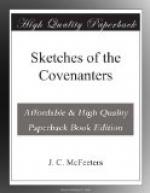THE FIRST SCHOOLS—1561.
The Public School system is the offspring of Protestantism. The human mind, when liberated by the Gospel of Jesus Christ, aspires after education, as the eagle soars into the upper air when set free from its cage. Freedom in Christ Jesus awakens consciousness of rights, powers, privileges, obligations, and the immeasurable boundaries of mind and spirit. With such breathings and aspirations these Presbyterian fathers planted free schools over their country and set the example for the world. The General Assembly authorized a school for every “parish”, and made attendance imperative. The children of the poor were instructed free, the rich contributed support. The studies covered “religion, grammar, and Latin.” Also in every “notable town, a college was to be erected for instruction in logic, rhetoric, and the learned languages.” Such was the work of the General Assembly in the year of our Lord 1561. Our system of Public Schools is but the extension of the orchard these fathers planted, in their far-reaching plans and great-hearted purposes.
Such were some of the steps taken by the fathers, in the Church of Scotland, at the dawn of the First Reformation. They were master builders in laying foundation stones. They were preparing for the onward movement, which gave to the world the most brilliant example of Church and State in Covenant with God. The like has not been witnessed since the days of Jesus of Nazareth. These beginnings were the stately steppings of God within His sanctuary. The Lord raised up men after His own heart, and empowered them by the Holy Spirit to perform this stupendous task. They were men of like passions with others, yet possessing the rare quality of an inviolate conscience. They were governed by principle, not expediency; were guided by truthfulness, not diplomacy; consulted God’s law, not convenience; accepted duty at God’s command, not at man’s dictate. Not all who were enrolled in the Church stood the test; some grew faint and fell back from the firing line. But enough were ever there to glorify God and do His service at any cost. Scotland’s First Reformation reached its climax in 1567.
The diligence and success of the fathers in the Lord’s work should inspire us to do the best within our power for the enlargement of the Church. Are we building, as they built, upon the true foundation, which is Jesus Christ? Is our building material like theirs—gold, silver, and precious stones? Are we zealous in making the Church of Christ appear the glorious Temple of truth, the Sanctuary of the living God, the Habitation of the Holy Spirit? Are we so consumed with the holy passion of love, that we cannot rest till we bring others into the house of God? Are we worthy of our relation to the Covenanted fathers?
* * * * *
Points for the class.




